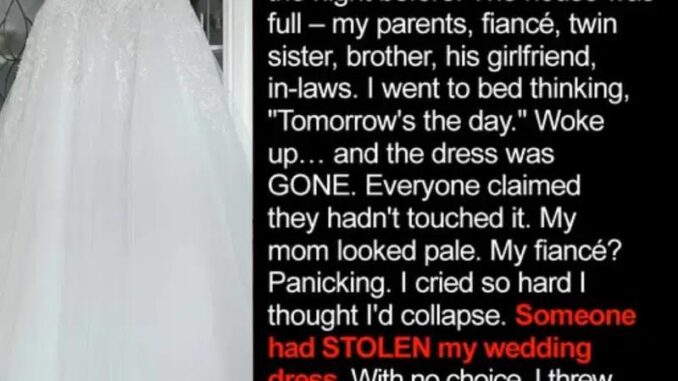
I’m Emily. At 27, I was preparing to marry Mark—the love of my life—after a chaotic decade of self-discovery. I’d spent a year planning every detail: spreadsheets, budgets, timelines. Friends joked I was more organized than a wedding planner. But I wasn’t aiming for good—I wanted perfect.
Dress shopping had taken me across three states. Too flashy, too dull, too expensive—nothing felt right. Then in a small downtown boutique, I found it. Not glamorous or name-brand, but perfect. I tried it on and felt like it was part of me. My mom cried and whispered, “That’s the one.”
The night before, the house buzzed with activity—family, Mark, last-minute tasks. My twin, Stacey, seemed supportive. We’re fraternal: her dark, angular features contrasted my softer blonde looks. But she’d always reminded me she was older by ten minutes, joking she should marry first. That evening she helped me hang the dress and said, “You’ll look amazing tomorrow.”
I went to sleep confident and happy. The next morning, I sneaked downstairs to peek—and the dress was gone. I screamed for my mom. A frantic search ensued, but Stacy was missing. I pulled out an off-white prom dress and wore it, but it felt wrong.
Two hours later, just as the music started, the church doors opened. Stacey appeared in my wedding dress, holding a bouquet. She walked confidently down the aisle, announcing: this day was meant for her. She said she was tired of living in my shadow and needed one moment to feel special.
Guests gasped. Mom calmly walked to the altar, took my hand, and addressed Stacey: “This is Emily—her day. Stealing your sister’s joy isn’t how we fix our hurt.” Stacey crumbled and returned to the pew. Mom told me I didn’t need a perfect dress—my heart, strength, and love for Mark were what mattered.
With Mom beside me, I walked down the aisle. The ceremony passed in a blur; at the reception, guests looked puzzled, whispers filled the air. Stacey disappeared after the ceremony in the dress, later returning alone and crying. Eventually she admitted she’d been depressed, lost her job, and felt invisible.
That was nearly a year ago. Stacey started therapy the next week. She’s working on herself, has a new job, medication, and we talk twice a week. We’re slowly rebuilding. That day was heartbreaking—but if it helped pull my sister out of darkness, maybe it wasn’t entirely a loss.